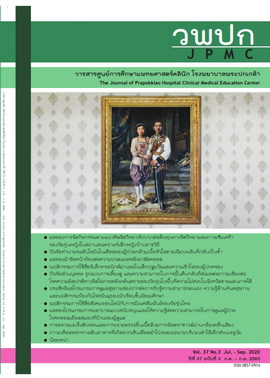Media Use in Early Childhood and Parental Attitudes
Main Article Content
Abstract
Background: Current reports discovered increased screen media usage in children, for which improper use can have negative impacts on the development, behavior, and health. This is especially true in early childhood which is a crucial time for brain development. In order to effectively supervise screen media usage, it is necessary to understand the usage behavior of children and parents.
Objectives: To study screen media usage behavior in early childhood as well as parental views towards children’s use of media.
Materials and Methods: This was a descriptive study of 326 parents with children aged 0-5 years by questionnaire at a pediatric clinic from July to September 2019.
Results: Most children under 2 years were exposed to electronic screen media (83.9%); 63.5 percent of children used a mobile device on a daily basis more than television (53.4%). The median screen time was 60 minutes a day for each activity, while 32.8 percent of the children were exposed to more than one media device simultaneously. Children 2 to 5 years of age used media multitasking more than children under 2 years (p<0.01). Children used media devices before bedtime at 41.7% and during meals at 23.3%, for which children 2 to 5 years of age used media devices both before bedtime and during meals significantly more than children under 2 years (p<0.01, p<0.02 respectively). Parents gave children media devices when doing house chores and to keep them calm at 54.9% and 41.4% respectively. 95.1% of parents agreed that children benefit from the screen media and 88.7% of parents agreed that it was difficult to control media usage. 17.4 percent of parents knew recommendations for children’s use of media and 43.6 percent of parents had been advised on this topic by healthcare providers.
Conclusion: The study found improper use of screen media in many ways. Parents had insufficient knowledge and understanding about children’s use of media. Health supervision of screen media usage is urgently needed with more systematic screening of children’s media habits.
Article Details
References
Duch H, Fisher EM, Ensari I, Font M, Harrington A, Taromino C et al. Association of screen time use and language development in Hispanic toddlers: a cross-sectional and longitudinal study. Clin Pediatr (Phila) 2013;52:857–65.
Chonchaiya W, Wilaisakditipakorn T, Vijakkhana N, Pruksananonda C. Background media exposure prolongs nighttime sleep latency in Thai infants. Pediatr Res 2017;81:322–8.
Vijakkhana N, Wilaisakditipakorn T, Ruedeekhajorn K, Pruksananonda C, Chonchaiya W. Evening media exposure reduces night-time sleep. Acta Paediatr 2015;104:306–12.
Chonchaiya W. Effects of electronic screen media on children and adolescents. Bangkok: Beyond Enterprise; 2018.
Cox R, Skouteris H, Rutherford L, Fuller-Tyszkiewicz M, Dell’Aquila D, Hardy LL. Television viewing, television content, food intake, physical activity and body mass index: a cross-sectional study of preschool children aged 2-6 years. Health Promot J Austr 2012;23:58–62.
Wen LM, Baur LA, Rissel C, Xu H, Simpson JM. Correlates of body mass index and overweight and obesity of children aged 2 years: findings from the healthy beginnings trial. Obesity (Silver Spring) 2014;22:1723–30.
Rideout V. The common sense census: media use by kids age zero to eight 2017. Common Sense Media [internet]. 2017 [cited 2018 Aug 1]. Available form: https://www.commonsensemedia.org/research/the-common-sense-census-media-use-by-kids-age-zero-to-eight-2017
Kabali HK, Irigoyen MM, Nunez-Davis R, Budacki JG, Mohanty SH, Leister KP, et al. Exposure and use of mobile devices by young children. Pediatrics 2015;136:1044–50.
Asplund KM, Kair LR, Arain YH, Cervantes M, Oreskovic NM, Zuckerman KE. Early childhood screen time and parental attitudes toward child television viewing in a low-income latino population attending the special supplemental nutrition program for women, infants, and children. Child Obesity 2015;11:590–9.
Council on communications and media. Media and young minds. Pediatrics [Internet]. 2016 [cited 2019 Oct 15];138:e20162591. Available from: https://pediatrics.aappublications.org/content/pediatrics/138/5/e20162591.full.pdf
Limtrakul N, Louthernoo O, Narkpongphun A, Boonchooduang N, Chonchaiya W. Media use and psychosocial adjustment in children and adolescents. J Paediatr Child Health 2018;54:296-301.
Chonchaiya W, Neesanun N. Early childhood (1-4 years). In: Noipayak P, Piyasil W, Ningsanon W, editors. Guideline in child health supervision. Bangkok: Sappasarn; 2014. p.247-63
Rideout V. Learning at home: families’educational media use in America. The Joan Ganz Cooney Center at Sesame Workshop [internet]. 2014 [cited 2019 Oct 15]. Available from: http://www.joanganzcooneycenter.org/publication/learning-at-home.
The royal college pediatricians of Thailand. Manual for parent to publish knowledge about child care and development in early childhood 0-3 years of age[internet]. 2017 [cited 2019 Aug 1]. Available from: http://www.thaipediatrics.org
Cheung CHM, Bedford R, Saez De Urabiain IR, Karmiloff-Smith A, Smit TJ. Daily touchscreen use in infants and toddlers is associated with reduced sleep and delayed sleep onset. Sci Rep 2017;7:46104. doi: 10.1038/srep46104.

